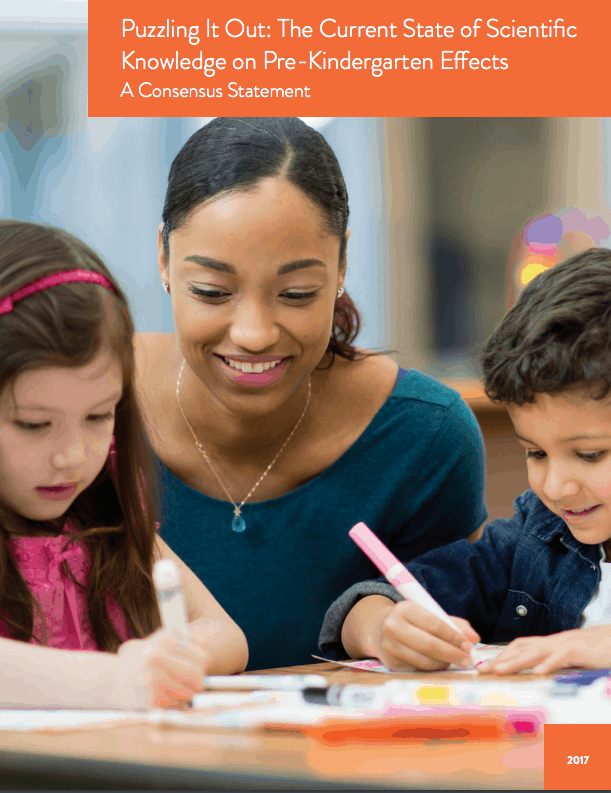 What should we expect preK programs to produce for our society? Are they working to support early child development and helping young learners prepare for future education? And how do we identify and replicate the most important features of successful preK programs?
What should we expect preK programs to produce for our society? Are they working to support early child development and helping young learners prepare for future education? And how do we identify and replicate the most important features of successful preK programs?
Those are just a few of the questions a recent report by a task force comprised of social scientists from Brookings and Duke University tries to tackle. “Puzzling it out: The current state of scientific knowledge on pre-kindergarten effects” shares six consensus statements on what we know about the effects of preK and offers insight on what still needs to be discovered to determine how effective public preK programs are for our youngest learners. The consensus statement used the most current evaluations of public preK programs to draw lessons about how well the programs are working overall.
6 Consensus Statements
The researchers developed six consensus statements from their review (in their words below to maintain meaning or edited slightly for space; read the full report here):
1. There is often greater improvement in learning among economically disadvantaged children and dual-language learners after a year of preK than there is for more advantaged and English-proficient children.
2. PreK programs are not all equally effective, but several effectiveness factors may be at work in most successful programs. One such factor is a well implemented, evidence-based curriculum. Coaching for teachers, as well as efforts to promote orderly but active classrooms, may also be helpful.
3. Children’s early learning trajectories depend on the quality of their learning experiences, not only before and during their preK year, but also following the preK year. Classroom experiences early in elementary school can serve as charging stations for sustaining and amplifying preK learning gains.
4. Convincing evidence shows that children attending a diverse array of state and school district pre-K programs are more ready for school at the end of the year than children who do not attend preK. Improvements in academic areas such as literacy and numeracy are most common.
5. Longer-term research studies to understand the impact of preK programs on school progress and academic outcomes are not widely available. The evidence that does exist often shows that preK-induced improvements in learning are detectable during elementary school, but studies also reveal null or negative longer-term impacts for some programs.
6. Ongoing innovation and evaluation are needed during and after preK to ensure continued improvement in creating and sustaining children’s learning gains. Research-practice partnerships are a promising way of achieving this goal.
What’s next for improving preK programs?
Even though preK programs provide a strong foundation for young learners, the report suggests a need to create more effective instructional strategy.
Researchers urge evaluators and administrators to focus on creating a smooth transition for preK students as they enter kindergarten. PreK students may be more prepared than their kindergarten classmates who did not attend preK, so developing a more effective strategy for preK students to transition will ensure they don’t lose their previous gains.
Successful preK programs also depend on effective teachers who are trained in the field and continually developing their skills, the researchers say. It is suggested that administrators consider how they can effectively support preK teachers to retain high-quality instructors and provide the best learning environment for early learners.
For the full report, and the researchers recommendations, visit the Brookings website.

